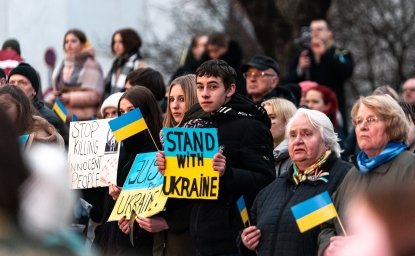
A blog of the Kennan Institute
How do civilian survivors of war tell themselves that they have endured? How do they reassert their humanity?
Such questions stand at the center of many new Ukrainian plays emerging from the current Russian invasion. One answer is that the smallest of gestures at times reassure us that there will be a future. Such moments can reveal the trauma and pain that remains after the realization that we have survived. Neda Nejdana’s Pussycat in Memory of Darkness, which sets out such a miniature tale with large insights, is one such play.
Few plays have hit the London theater scene of late with the impact of Nejdana’s Pussycat. Having earned kudos from London’s theatrical press (including five stars from The Stage and four stars from The Guardian), the play was nominated for the best new “Off West End” play, and the show’s lead, Kristin Milward, is in contention for honors as the best “Off West End” Lead Performance in a Play.
The show, translated into English by John Fardon, has enjoyed two runs at London’s Finborough Theater, a 50-seat venue over a pub in West Brompton well known for presenting worthy, though overlooked, works. Local theater enthusiasts closely watch for successful runs at the Finborough despite its diminutive size. Praise at the Finborough can lead to wider success. For Pussycat, prior and subsequent productions have taken place in Kyiv, Atlanta, and Wiesbaden, with more productions certain to follow.
The play takes place in Donbas during 2014, when the Russians first invaded Ukraine’s eastern region. A woman stands in the street wearing a pair of dark black sunglasses as she tries to sell a basket of kittens. She already has lost her home and her family during the violence at war’s outset. Betrayed by her neighbor and brutalized by Russian-backed militia, she is trying to find hope the only place she can: in a basket of kittens, which she is trying to sell. The kitties’ innocence seems to offer the hope of new life even as she is pleading with the audience to buy the last one left in her basket.
Reviewer Barbara Lewis, on the London Grip website which serves as a repository for theater reviews, said that “Milward, under [Polly] Creed’s direction, inhabits the role and takes us as close as an outsider can get to the experience of invasion and occupation. She makes a one-woman play the perfect vehicle for the story of a woman whose once rich life, peopled with a loving family living in an ancestral home, is stripped back to just herself—her inner strength and a tiny kitten.” The Guardian called the work “an hour-long howl against the betrayals of Ukraine by Russia and NATO.
Nejdana’s career reflects the creative possibilities that opened with Ukrainian independence, which arrived when she was 20. A native of Kramatorsk in the Donetsk region, she is a playwright, art critic, and translator. She attended several of Kyiv’s leading universities and earned a doctoral degree in literary theory. She worked as a theater journalist and, in 2006, became one of the founders of the independent MIST Theater.
Nejdana, whose works also have appeared under the Russian rendering of her name, Nezhdana, has authored more than two dozen original plays as well as two collections of poetry. She has participated in theatrical productions across Europe, the former Soviet Union, and North America, winning numerous prizes along the way.
Pussycat originally appeared in 2015 and quickly found a new following with the 2022 Russian invasion and the play’s inclusion in the Worldwide Ukrainian Play Readings Project. As reported previously (March 23, 2022, May 16, December 9, and March 17, 2023), theater critic John Freedman launched that initiative in cooperation with Philip Arnoult at Baltimore’s Center for International Theater Development, Maksym Kurochkin at Kyiv’s Theater of Playwrights, Noah Birksted-Breen at London’s Sputnik Theatre, and others. For more than a year, the project has promoted readings around the world of works by Ukrainian playwrights.
The connection between the Russian aggression of 2014 and that of 2022 has only strengthened the power of Nejdana’s work. Writing for the Lost in Theatreland website, Mailí Ní Ghormáin observed that “Pussycat in Memory of Darkness is a vital commission by the Finborough Theatre, who have not only produced this twice in the last year as a response to the Russian invasion of Ukraine, but also took the play to Ukraine last December, making it the first performance by a foreign company there since the invasion. Neda Nezhdana, [BR - she has subsequently changed the spelling of her last name from the Russian Nezhdana to the Ukrainian Nejdana] an acclaimed writer in Ukraine though little known in the UK, remains in Ukraine and continues to write, saying that all of her work now feels like it must relate to the inhumanity of the Russian invasion. Pussycat is no exception, set in the 2014 invasion of Crimea, the torture of the protagonist is even more harrowing in the audience’s knowledge of what is to come.”
Nejdana’s Pussycat demonstrates the command of Ukrainian theater works as they move from readings to full productions. Such theater offers powerful opportunities for companies abroad. As critic John Groves wrote in a review of Pussycat for LondonTheatre website, which promotes theatrical productions, “near the start of this review, I said that this play is depressing. It is, BUT it is also inspiring, showing how and why people are determined to survive in spite of governments, politics and politicians rather than because of them.”
As Nejdana’s Pussycat and other Ukrainian works written in response to war demonstrate, such works could not be more fitting at this historical moment for theater seasons anywhere. Sometimes, it is the smallest of stories – such as that of a traumatized woman trying to sell kittens – that reveal the largest truths.
The opinions expressed in this article are those solely of the author and do not reflect the views of the Kennan Institute.
Author

Former Wilson Center Vice President for Programs (2014-2017); Director of the Comparative Urban Studies Program/Urban Sustainability Laboratory (1992-2017); Director of the Kennan Institute for Advanced Russian Studies (1989-2012) and Director of the Program on Global Sustainability and Resilience (2012-2014)

Kennan Institute
The Kennan Institute is the premier US center for advanced research on Eurasia and the oldest and largest regional program at the Woodrow Wilson International Center for Scholars. The Kennan Institute is committed to improving American understanding of Russia, Ukraine, Central Asia, the South Caucasus, and the surrounding region through research and exchange. Read more

Explore More in Focus Ukraine
Browse Focus Ukraine
A Stunning Prayer for Ukraine

Fears Beyond a Peace Agreement and a Possible Compromise

Turning Bombshells into Fireworks, Bullets into Raindrops

